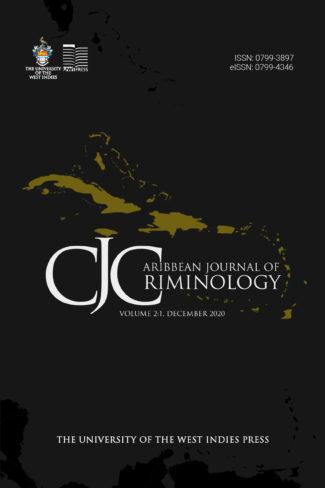
Kingston, Jamaica (May 17, 2022) - Community based violence intervention, discriminatory extensions of colonialism in criminal justice systems, policing strategies from the Global North and the infrastructural support for Caribbean data driven decision-making are issues revived by seventeen authors across The University of the West Indies, Universities in North America and the United Kingdom and citizen security organizations writing in the newly published Caribbean Journal of Criminology Volume 3. Issue 1.
Themed International Research Collaborations, the Issue is edited by Professors Edward Maguire and Charles Katz from the Arizona State University. Although each article is written against the background of a unique context, the call for more nuanced understandings of strategies aimed at addressing criminal behaviour form a common theme throughout the Issue. Maguire and Katz write about the contributions:
“The articles presented in this issue raise interesting and provocative questions about a variety of issues. One theme that emerges across the articles is the extent to which criminological theories and practices from the developed world are necessary, appropriate or valid in the Caribbean. This issue is reminiscent of a long-standing debate over the future of Caribbean criminology, some of which was featured in previous renditions of this journal”
The Caribbean Journal of Criminology is a publication of the Institute of Criminal Justice and Security and it is published by the University of the West Indies Press.
CJC 2021 Table of Contents
Editorial: International Research Collaborations in the Caribbean by Edward R. Maguire and Charles M. Katz.
Confronting Silences Haunting Guyana’s Juvenile Justice System by Kristy Warren, Kellie Moss, Dylan Kerrigan, Tammy Ayres, Clare Anderson, and Queenela Cameron.
Cut and Paste Policing? An Assessment of Compstat’s Importation and Implementation in a Developing Country by Aleem Mahabir and Robert Kinlocke.
Interrupting Gang Violence in Urban Trinidad through Conflict Mediation by Ericka B. Adams, Patrice K. Morris, and Edward R. Maguire.
Enhancing the Capacity for Data-Driven Decision-Making on Citizen Security across the English-Speaking Caribbean: A Case Study of CariSECURE by Charles M. Katz, John Walcott, Kayla Freemon, and Paolo del Mistro.
Review of the Book: Recidivism in the Caribbean: Improving the Reintegration of Jamaican Ex-prisoners. Dacia Leslie by Regan Reid.
Farewell from Former Editor by Anthony Harriott.
For further information about the Caribbean Journal of Criminology please contact the Institute of Criminal Justice and Security. Telephone (876)9776275/9700438. Email: icjs@uwimona.edu.jm or contact for subscription,The University of the West Indies Press. (876)977-2659, (876) 702-4082, uwipress.journals@uwimona.edu.jm.
END






